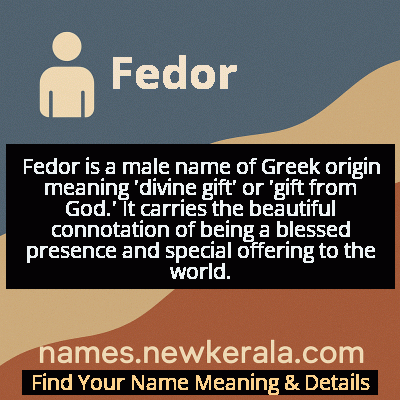Fedor Name Meaning & Details
Origin, Popularity, Numerology Analysis & Name Meaning of Fedor
Discover the origin, meaning, and cultural significance of the name FEDOR. Delve into its historical roots and explore the lasting impact it has had on communities and traditions.
Name
Fedor
Gender
Male
Origin
Greek
Lucky Number
3
Meaning of the Name - Fedor
Fedor is a male name of Greek origin meaning 'divine gift' or 'gift from God.' It carries the beautiful connotation of being a blessed presence and special offering to the world.
Fedor - Complete Numerology Analysis
Your Numerology Number
Based on Pythagorean Numerology System
Ruling Planet
Jupiter
Positive Nature
Optimistic, inspirational, and creative.
Negative Traits
Scattered, exaggerating.
Lucky Colours
Yellow, gold, purple.
Lucky Days
Thursday.
Lucky Stones
Yellow sapphire.
Harmony Numbers
1, 2, 9.
Best Suited Professions
Arts, writing, communication.
What People Like About You
Creativity, optimism.
Famous People Named Fedor
Fyodor Dostoevsky
Novelist and philosopher
Authored literary masterpieces including 'Crime and Punishment' and 'The Brothers Karamazov'
Fedor Emelianenko
Mixed martial artist
Four-time World Combat Sambo Champion and former PRIDE Heavyweight Champion
Fedor Tyutchev
Poet and diplomat
Renowned Russian Romantic poet and influential political thinker
Fedor Chalov
Professional footballer
Russian international striker and CSKA Moscow's record goalscorer
Name Variations & International Equivalents
Click on blue names to explore their detailed meanings. Gray names with will be available soon.
Cultural & Historical Significance
The name gained particular prominence in Russian history, being borne by several Tsars and nobility, which elevated its status while maintaining its accessibility to all social classes. During the Soviet era, while religious names faced some decline, Fedor persisted due to its deep cultural roots and association with respected literary and historical figures. Today, it represents a connection to Slavic heritage, Orthodox Christian traditions, and the intellectual and spiritual legacy of Russian culture, serving as a bridge between ancient traditions and modern identity.
Extended Personality Analysis
Individuals named Fedor are typically characterized by a blend of strength, wisdom, and deep-seated principles. They often exhibit a calm, thoughtful demeanor combined with remarkable resilience in facing life's challenges. Their personality tends to reflect the name's meaning of being a 'divine gift' through their generous nature and ability to positively impact those around them. Fedors are frequently seen as pillars of their communities—reliable, trustworthy, and guided by a strong moral compass.
These individuals often possess intellectual depth and philosophical inclinations, showing interest in understanding life's bigger questions while remaining grounded in practical reality. Their strength is not typically expressed through aggression but through steadfastness and the quiet confidence that comes from knowing one's values. Fedors tend to be loyal friends and family members who provide stability and wisdom during difficult times. They often demonstrate patience in decision-making and a capacity for deep, meaningful relationships built on mutual respect and understanding.
Modern Usage & Popularity
In contemporary society, Fedor maintains a respected position among traditional Slavic names, though its popularity has evolved with changing naming trends. While not as common as it was in previous generations, the name enjoys steady usage particularly among families with strong connections to Russian or Eastern European heritage. Recent years have shown a modest revival of interest in classic Slavic names, with Fedor benefiting from this cultural reawakening. The name is particularly favored by parents seeking a name that combines traditional values with distinctive character, avoiding both overly common modern names and obscure antiquated ones. Its international recognition through famous bearers and literary associations ensures that Fedor remains a name with both cultural depth and global appeal, representing a balance between heritage and contemporary relevance.
Symbolic & Spiritual Meanings
Symbolically, Fedor embodies the concept of divine blessing and purposeful existence. The name represents the idea that each person carries unique gifts meant to contribute to the world, reflecting the original Greek meaning of 'gift of God.' It symbolizes spiritual protection and guidance, suggesting that the bearer operates under a higher purpose or destiny. Metaphorically, Fedor represents the bridge between human potential and divine intention, emphasizing that true strength comes from alignment with one's authentic nature and values.
The name also carries symbolic weight as a connector between generations, representing cultural continuity and the preservation of wisdom across time. It suggests that the qualities of resilience, integrity, and spiritual depth are not just personal attributes but part of a larger cultural and historical legacy. In a broader sense, Fedor symbolizes the enduring power of tradition and the importance of maintaining connections to one's roots while navigating modern life.

